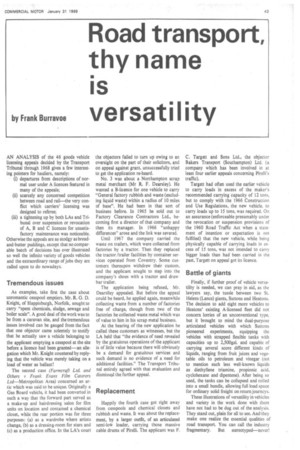Road transport, thy name is is
Page 45

If you've noticed an error in this article please click here to report it so we can fix it.
by Frank Burravoe versatility
AN ANALYSIS of the 46 goods vehicle licensing appeals decided by the Transport Tribunal through 1968 gives a few interesting pointers for hauliers, namely: • (i) departures from descriptions of normal user under A licences featured in many of the appeals; (ii) scarcely any concerned competition between road and rail—the very conflict which carriers' licensing was designed to referee; (iii) a tightening up by both LAs and Tribunal over suspension or revocation of A, B and C licences for unsatis factory maintenance was noticeable. Otherwise the appeals are as stodgy as bread and-butter puddings, except that no comparable batch of decisions has ever illustrated so well the infinite variety of goods vehicles and the extraordinary range of jobs they are called upon to do nowadays.
Tremendous issues
As examples, take first the case about unromantic cesspool emptiers. Mr. R. G. D. Knight, of Happisburgh, Norfolk, sought to carry "spent chemicals, sludge, sewage and boiler scale". A good deal of the work was to be from a caravan site, and the tremendous issues involved can be gauged from the fact that one objector came solemnly to testify that he actually saw a vehicle belonging to the applicant emptying a cesspool at the site before a licence had been granted—an allegation which Mr. Knight countered by replying that the vehicle was merely taking on a load of water as ballastl
The second case (Farmeraft Ltd. and Others v Frank Evans Film Caterers Ltd—Metropolitan Area) concerned an artic which was said to be unique. Originally a Gas Board vehicle, it had been converted in such a way that the forward part served as a make-up and hairdressing salon for film units on location and contained a chemical closet, while the rear portion was for three purposes; (a) as a wardrobe where artists change, (b) as a dressing-room for stars and (c) as a production office. In the LA's court
the objectors failed to turn up owing to an oversight on the part of their solicitors, and on appeal against grant, unsuccessfully tried to get the application re-heard.
No. 3 was about a Northampton scrap metal merchant (Mr R. F. Dearsley). He wanted a B-licence for one vehicle to carry "General factory rubbish and waste (excluding liquid waste) within a radius of 10 miles of base". He had been in that sort of business before. In 1965 he sold out to Factory Clearance Contractors Ltd., becoming first a director of that company and then its manager. In 1966 "unhappy differences" arose and the link was severed.
Until 1967 the company carried the waste on trailers, which were collected from factories by a tractor. Then they replaced the tractor /trailer facilities by container services operated from Coventry. Some customers thereupon withdrew their custom, and the applicant sought to step into the company's shoes with a tractor and drawbar trailer.
The application being refused, Mr. Dearslley appealed. But before the appeal could be heard, he applied again, meanwhile collecting waste from a number of factories free of charge, though from two of the factories he collected waste metal which was of value to him in his scrap metal business.
At the hearing of the new application he called these customers as witnesses, but the LA held that -the evidence of need revealed by the gratuitous operations of the applicant is of little value because there will obviously be a demand for gratuitous services and such demand is no evidence of a need for additional facilities." The Transport Tribunal entirely agreed with that evaluation and dismissed the further appeal.
Replacement
Happily the fourth case got right away from cesspools and chemical closets and rubbish and waste. It was about the replacement, by a larger outfit, of an articulated semi-lo' loader, carrying those massive cable drums of Pirelli. The applicant was F. C. Targett and Sons Ltd., the objector Bakers Transport (Southampton) Ltd. (a company which has been involved in at least four earlier appeals concerning Pirelli's traffic).
Targett had often used the earlier vehicle to carry loads in excess of the maker's recommended carrying capacity of 12 tons, but to comply with the 1966 Construction and Use Regulations, the new vehicle, to carry loads up to 15 tons, was required. On an assurance (enforceable presumably under the revocation or suspension provisions of the 1960 Road Traffic Act when a statement of intention or expectation is not fulfilled) that the new vehicle, while being physically capable of carrying loads in excess of 15 tons, was not intended to carry bigger loads than had been carried in the past, Targett on appeal got its licence.
Battle of giants
Finally, if further proof of vehicle versatility is needed, we can pray in aid, as the lawyers say, the tussle between two St. Helens (Lanes) giants, Suttons and Heatons. The decision to add eight more vehicles to Heatons' existing A-licensed fleet did not concern lorries of an unconventional type, but it brought to mind the dual-purpose articulated vehicles with which Suttons pioneered experiments, equipping the vehicles with strapped flexible tanks with capacities up to 2,500gal. and capable of carrying several score different kinds of liquids, ranging from fruit juices and vegetable oils to petroleum and vinegar (not to mention such less well-known liquids as diethyllene triamine, propionic acid, cyclohexane and dipentene). After being so used, the tanks can be collapsed and rolled into a small bundle, allowing full load space for ordinary solid freight on return journeys.
These illustrations of versatility in vehicles and variety in the work done with them have not had to be dug out of the analysis. They stand out, plain for all to see. And they make one realize the essential qualities of road transport. You can call the industry fragmentary. But stereotyped—never?




































































































